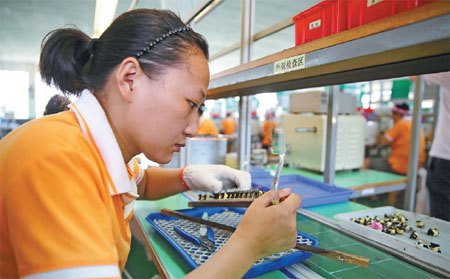PMI rise signals success of govt support policies
Updated: 2014-08-04 13:32
By Wei Tian in Shanghai (China Daily USA)
|
||||||||
Manufacturing activity strongest in 26 months, but employment lags
The Chinese economy may have touched bottom last month as manufacturing activity reached a nearly two-year high, suggesting that government support policies are having the desired impact.
The official manufacturing Purchasing Managers Index, a widely watched indicator, rose to 51.7 in July from 51.0 the previous month, the China Federation of Logistics and Purchasing announced on Friday.
"The PMI continued its recovery momentum at a faster pace. That suggests the overall trend for the economy is to stabilize from its down-turn, and that trend will persist for a while," said Zhang Liqun, an economist at the Development Research Center of the State Council (cabinet).
A PMI reading above 50 reflects an expansion in manufacturing, while one below 50 signals a contraction.
The improvement in July was the fifth monthly rise in a row. It also took the PMI to the highest level in 26 months.
Of the five sub-indexes of the PMI, only one - that for employment - failed to improve. Zhang said this means capital and technology may have replaced labor as the "driver of development" in the manufacturing sector. The official survey was conducted by the National Bureau of Statistics, and it covered 3,000 companies nationwide in 31 manufacturing industries.
NBS statistician Zhao Qinghe attributed the July increase to the government's growth-stabilizing policies and the improving external environment, which helped boost production and new orders.
But Zhao noted that the performance of large manufacturers is generally better than that of small ones, and the latter group "needs more fiscal and monetary support from the government".
In the official data, the PMI for small enterprises stood at 50.1 in July, rising into expansionary territory for the first time since April 2012.
That reading was also in line with the PMI released jointly on Friday by HSBC Holdings Plc and Markit Ltd, which better reflects conditions for smaller businesses. The final reading for the HSBC-Markit PMI was 51.7, below the preliminary reading of 52.0.
Faced with an ongoing slowdown in GDP growth from 7.7 percent last year to 7.4 percent in the first half, Chinese policymakers have pinned their hopes on accelerating investment and speeding up fiscal spending, combined with a selective easing in monetary policy.
A State Council (cabinet) meeting last month outlined 10 specific measures, including more support to small businesses through relending, streamlining administrative procedures and eliminating unnecessary fees to give companies in targeted sectors easier access to money.
"Expansion in the PMI suggests that the support policies have borne fruit. The economy will be even better in the third quarter," said Lian Ping, chief economist with the Shanghai-based Bank of Communications Ltd.
"As the macroeconomy stabilizes, more support policies will push up overall financing demand. An accommodative monetary stance will also lead to rapid growth in credit supply," he said.
GDP growth may reach 7.5 percent in the third quarter, said Wang Tao, chief China economist with UBS AG. However, despite a widely anticipated rebound in the third quarter, Wang said the economy may again face downward pressure in the fourth quarter, mainly due to the impact of the cooling property market. "The government may be forced to launch more support policies," she said.
"It is expected that the central government will continue to ensure the implementation of 'mini-stimulus' policies to stabilize economic growth, adjust the economic structure and improve living standards," said Thomas Stanley, chief operating officer with KPMG LLP's global China practice.
KPMG has forecast that China's second-half economic growth will be higher than 7.5 percent, and that full-year GDP growth will achieve the government's 2014 target of 7.5 percent.
"The recent economic data show that the Chinese economy is continuing its steady evolution away from a 'growth-above-all' model ... I expect that China should now be able to sustain this level of economic performance with-out a major course correction," Stanley said.
Xinhua contributed to this story.
weitian@chinadaily.com.cn
|
A worker assembles electronic components at a factory in Huaying, Sichuan province. Provided to China Daily |
(China Daily USA 08/04/2014 page14)

 M6.5 quake hits SW China
M6.5 quake hits SW China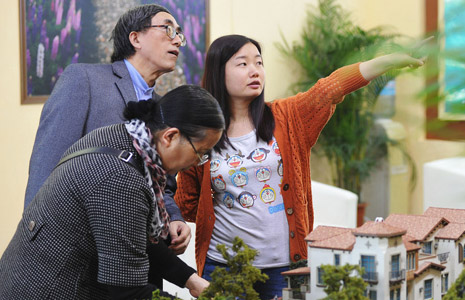
 10 Chinese cities that lifted property curbs in July
10 Chinese cities that lifted property curbs in July
 Culture Insider: Customs of Sanfu - the dog days of summer
Culture Insider: Customs of Sanfu - the dog days of summer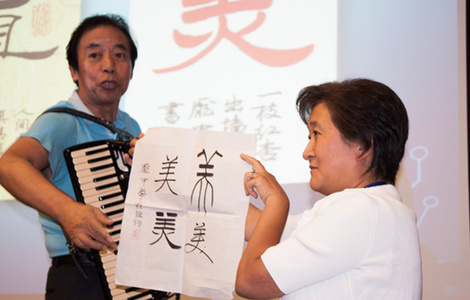
 Calligrapher brings distinctive script to US
Calligrapher brings distinctive script to US
 Chinese Consulate uses baseball as bridge for US ties
Chinese Consulate uses baseball as bridge for US ties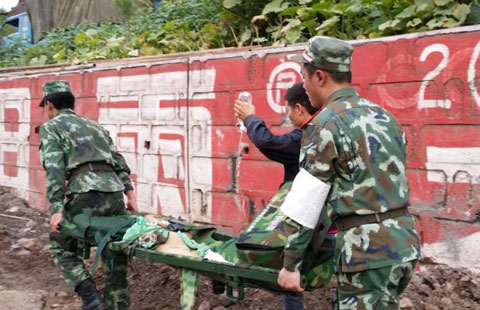
 M6.5 quake hits SW China
M6.5 quake hits SW China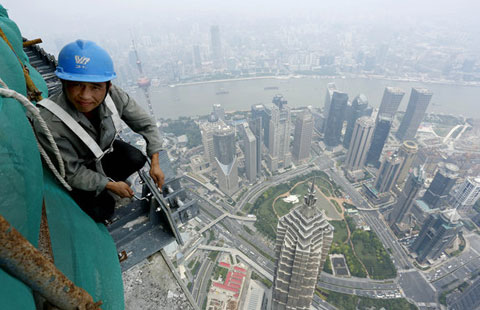
 Shanghai Tower gets finishing touch
Shanghai Tower gets finishing touch
 'Diaper Derby' competition in New York
'Diaper Derby' competition in New York
Most Viewed
Editor's Picks

|

|

|

|

|

|
Today's Top News
US ready to help China in quake relief
Opinion: US competes for better ties with Africa
Half a million under water-related state-of-emergency in Ohio
Xinjiang offers cash rewards for those hunting terrorists
373 dead as strong quake jolts SW China
Xi:save people's lives first after quake
69 dead, 150 injured in E China factory blast
Ebola-stricken American arrives in U.S. for treatment
US Weekly

|

|
